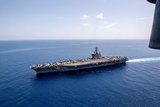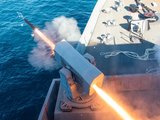Naval BMD could lose the human touch
The US is exploring a new platform for ballistic missile defence (BMD), after the Pentagon floated the idea of using unmanned surface ships.
This concept — if adopted — could one day yield a flotilla of USVs packed with interceptors to continuously patrol defended areas, freeing up destroyers to conduct other operations.
The concept is at a nascent stage but the technology to support the mission is maturing.
Navy Secretary Kenneth Braithwaite advanced the idea in May, in a written response to questions submitted ahead of his nomination hearing before the Senate Armed Services Committee.
The committee wanted to know about
Already have an account? Log in
Want to keep reading this article?
More from Naval Warfare
-
![RTX Raytheon targets nearly 170% RAM production increase to meet global demand]()
RTX Raytheon targets nearly 170% RAM production increase to meet global demand
The US multinational company is currently assembling 300 Rolling Airframe Missile rounds per year, with plans to reach 800 units annually after significant investment and modernisation of its facilities.
-
![Spain’s F100 upgrade mirrors Aegis modernisation paths in allied navies]()
Spain’s F100 upgrade mirrors Aegis modernisation paths in allied navies
The Spanish Navy’s Alvaro de Bazan-class of air defence frigates will receive the latest Aegis Weapon System technology among other modernisations to extend the service life to 2045.
-
![UK’s Fleet Solid Support ship programme deemed on track despite steel supply concerns]()
UK’s Fleet Solid Support ship programme deemed on track despite steel supply concerns
Shipbuilders are saying the programme is going ahead on time as the government estimates 7.7 million tonnes of steel are needed for 2026 infrastructure projects.
-
![Raytheon unveils details of its proposal for the US Navy/NATO ESSM Next Significant Variant]()
Raytheon unveils details of its proposal for the US Navy/NATO ESSM Next Significant Variant
In an exclusive interview with Shephard, Raytheon’s VP of Shipboard Missiles disclosed what improvements the company plans to offer for the Sea Sparrow NSV.























